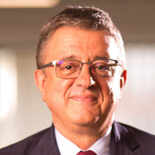Event Summary
Speakers
- Mihai Stirbulescu, Head of Operations and Maintenance
- Gaetano Vico, DG Echo
- Samantha Cook, Senior Financial Sector Specialist
Description
Friday 29 November, 09:30 – 11:00, Nicolae Iorga Room
Infrastructure services are essential for raising and maintaining people’s quality of life. Yet millions of people are facing the consequences of unreliable electricity grids, inadequate water and sanitation systems, and overstrained transport networks. Natural hazards magnify the challenges faced by these fragile systems. A new report lays out a framework for understanding infrastructure resilience—the ability of infrastructure systems to function and meet users’ needs during and after a natural shock—and it makes an economic case for building more resilient infrastructure. It identifies the key obstacles to resilient infrastructure and offers concrete recommendations and specific actions that can be taken to improve the quality and resilience of these essential services, and thereby contribute to more resilient and prosperous societies. This session will discuss the impact of disruptions as well as opportunities in improving the resilience of infrastructure. It will share the key findings and recommendations of a World Bank flagship report “Lifelines: The Resilient Infrastructure Opportunity”, which considers resilience at various levels of interventions including asset, system, network and user perspective, which can bring substantial benefits to people and economies.
The session will also highlight ongoing activities in various countries to improve infrastructure resilience, and discuss ongoing and planned developments at the European level in this area.
Speaker bios
 Mihai Stirbulescu, Head of Operations and Maintenance, CE-Distribution
Mihai Stirbulescu, Head of Operations and Maintenance, CE-Distribution
Gaetano Vivo is the Team Leader for the Prevention and Preparedness Programme in the European Commission’s Directorate General for European Civil Protection and Humanitarian Operations (DG ECHO). Among other re-sponsibilities, he manages a financial instrument providing grants for disaster resilience in Europe and its Neighborhoods and a programme of peer re-views addressing civil protection/disaster risk management institutions and policies. Before joining the European Commission in 2016, Gaetano worked for the World Bank in Washington DC, where he was Team Leader for in-vestment projects and technical assistance services in several Latin American and Caribbean countries focusing on: modernization of hydro-meteorological and climate services, disaster risk reduction and post-disaster recovery and reconstruction, critical infrastructure resilience, etc. Previously he worked with the Global Facility for Disaster Reduction and Recovery (GFDRR) in Washington DC and Brussels and with the Civil Protection Department of the Italian Government on a post-conflict reconstruction program in South Su-dan. Native of Italy, Gaetano holds a Master Degree in Communications and Political Science from the University of Bologna and has lived and worked in North America, the Caribbean and Africa.
 Samantha Cook has been with the World Bank Crisis and Disaster Risk Finance team since 2012 and has over 10 years of experience in the design and implementation of sovereign disaster risk financing instruments. Saman-tha was instrumental in the establishment of the Pacific Catastrophe Risk Insurance Company and its regional catastrophe risk insurance scheme. She has experience of working in Asia, Pacific, Africa and more recently Europe. Prior to joining the Bank Samantha worked in both central and investment banking as a macroeconomist and has been leveraging this expertise to en-sure that crisis and disaster risk is recognized as a macro-fiscal issue.
Samantha Cook has been with the World Bank Crisis and Disaster Risk Finance team since 2012 and has over 10 years of experience in the design and implementation of sovereign disaster risk financing instruments. Saman-tha was instrumental in the establishment of the Pacific Catastrophe Risk Insurance Company and its regional catastrophe risk insurance scheme. She has experience of working in Asia, Pacific, Africa and more recently Europe. Prior to joining the Bank Samantha worked in both central and investment banking as a macroeconomist and has been leveraging this expertise to en-sure that crisis and disaster risk is recognized as a macro-fiscal issue.
